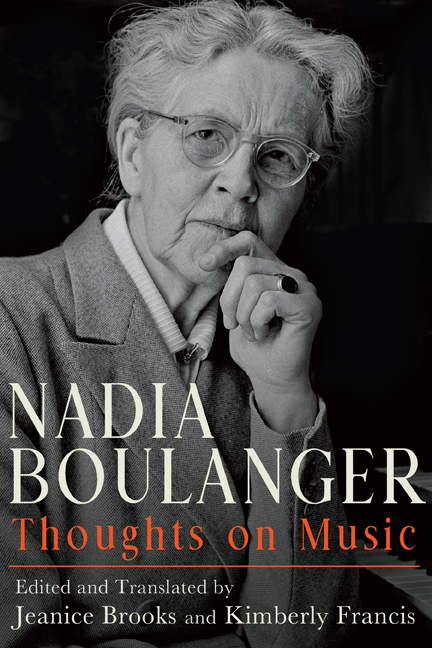Book contents
- Frontmatter
- Contents
- List of Illustrations
- Acknowledgments
- Editorial Apparatus and Critical Notes
- Note on Translations
- List of Abbreviations
- Timeline of Nadia Boulanger’s Life
- Introduction
- Part One Journalism, Criticism, Tributes
- Part Two Lectures, Classes, Broadcasts
- Bibliography of Nadia Boulanger’s Published Writing
- General Bibliography
- Index
“Simples Réflexions,” Colonne-Lamoureux, Le Monde musical 30, no. 3 (March 1919): 68-70 (excerpt)
Published online by Cambridge University Press: 15 October 2020
- Frontmatter
- Contents
- List of Illustrations
- Acknowledgments
- Editorial Apparatus and Critical Notes
- Note on Translations
- List of Abbreviations
- Timeline of Nadia Boulanger’s Life
- Introduction
- Part One Journalism, Criticism, Tributes
- Part Two Lectures, Classes, Broadcasts
- Bibliography of Nadia Boulanger’s Published Writing
- General Bibliography
- Index
Summary
Concerts Reviewed
February 2, 1919
Overture “Namensfeier,” op. 115, Ludwig van Beethoven
Brandenburg Concerto no. 5 in D major, BWV 1050, Johann Sebastian Bach
Passacaglia, C minor, BWV 582, Johann Sebastian Bach
La Vague et la cloche, Henri Duparc
Le Rhin allemand, Julien Tiersot
Armenia, canti armeni tradotti sinfónicamente, Gian Francesco Malipiero
Pupazzetti, op. 27, Alfredo Casella
Symphony no. 3 “Bucolic,” B-flat minor, op. 11, Albéric Magnard
February 9, 1919
Namouna, Edouard Lalo
Fantasietta, Théodore Dubois
Typhaon, Claude Delvincourt
L’Étranger, op. 53, “Introduction to Act II,” Vincent d’Indy
Symphony no. 6, “Pastoral,” F major, op. 68, Ludwig van Beethoven
February 16, 1919
Gwendoline,“Overture,” Emmanuel Chabrier
Dolly, op. 56, Gabriel Fauré
Orphée, Jean Roger-Ducasse
Clarinet Quintet, A major, K. 581, “Larghetto,” Wolfgang Amadeus Mozart
La Belle au bois dormant, op. 48, Guy de Lioncourt
Symphony no. 4, D minor, op. 120, Robert Schumann
February 23, 1919
Les Perses,“La Tragédie d’Eschyle,” Xavier Leroux
Poeme depitié, Antoine Mariotte
Symphony no. 2, Augustin Savard
Ballade, F# major, op. 19, Gabriel Fauré
Petrushka, Igor Stravinsky
Simple Reflections
Yet another month has gone by. In spite of all the gazes bound to the past, in spite of all the mourning amassed during these years of holocaust, of all the sacrifices, be they desired or accepted, life is rising up from the ruins, perhaps the stronger for being more rarefied, perhaps intensified because of all those ardent and rich existences that were destroyed before they had expressed themselves, and which dominate our era with all the purity, with all the flame of their heroic youth.
We come out of those terrible years with new glory, but above all, with new duties. Each of us must envisage them as a whole, then consider our own.
Individually, the task could be easy, if it is only a question of a little selflessness, courage, and abandon of the heart.
Collectively, the thing is more complicated, as the problem needs to be tackled from the root before being addressed in close union, if, that is, we are to transcend the domain of utopia.
Nevertheless, it seems that the time has come to consider the situation seriously, frankly.
- Type
- Chapter
- Information
- Nadia BoulangerThoughts on Music, pp. 82 - 90Publisher: Boydell & BrewerPrint publication year: 2020

